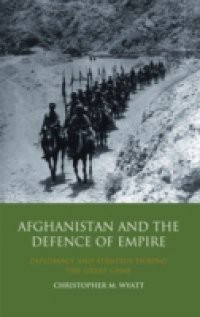At the height of the 'Great Game' in Central Asia, in the aftermath of the Second Afghan War and in the run up to World War I, the region of Afghanistan became particularly significant for both Great Britain and Russia. In Afghanistan and the Defence of Empire, Christopher M. Wyatt explores the relationship between British and Afghan rulers, as the British sought to safeguard their Indian Empire from the threat of Imperial Russia. With Russia's defeat at the hands of the Japanese in 1905 and the rise of Germany, the need to end the Anglo-Russian rivalry took on the utmost importance. But committed to upholding Afghan territorial integrity by treaty, the British (through the Government of India) were caught in a position where they might be obliged to fight a war they could not win, but could lose face by failing to act. Examining an era of concessions and imperial ambition, this book explores the military planning and decision-making process of British diplomats and politicians (such as the Lords Kitchener and Curzon), in their efforts to retain the British position in the 'Great Game' through diplomacy and negotiation. Afghanistan and the Defence of Empire thus offers a unique and ground-breaking analysis of the crucial period of the reign of Amir Habibullah Khan, the Amir of Afghanistan. It is this period which saw the British and the Russians locked in a constant diplomatic rivalry to secure their frontiers and empires, and culminated in the signing of the 1907 Anglo-Russian Convention, which agreed to divide up Persia, Afghanistan and Tibet into spheres of influence. As the history of Afghanistan becomes ever more crucial for the understanding of its present military and political situation, this book will be of vital interest for students of History, Central Asian Studies, Military History and International Relations.

